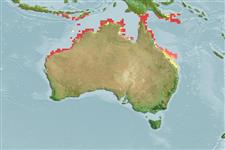इलाज़मौबरांकी (शारक और रेज़) (sharks and rays) >
Orectolobiformes (Carpet sharks) >
Orectolobidae (Carpet or nurse sharks)
Etymology: Orectolobus: orektos (Gr.), stretched out; lobus (L.), from lobos (Gr.), rounded projection or protuberance, referring to long nasal barbels of Squalus barbatus (=O. maculatus). (See ETYFish); wardi: In honor of Australian actor, musician and naturalist Charles Melbourne Ward (1903-1966), who collected holotype. (See ETYFish).
More on author: Whitley.
Environment: milieu / climate zone / depth range / distribution range
पारिस्थितिकी
समुद्री प्रवाल-भित्ति संयुक्त; गहराई सीमा 1 - 3 m (Ref. 43278). Tropical; 9°S - 26°S, 114°E - 154°E
Western Central Pacific: Australia.
आकार / वज़न / Age
Maturity: Lm ? range ? - ? cm
Max length : 63.0 cm TL पुल्लिंग / अलिंग; (Ref. 6871)
पृष्ठीय रीढ़ (सम्पूर्ण) : 0; गुदा कांटा: 0. Dark rounded saddles with light outlining widely spaced by dusky areas and with a few dark spots; saddles on head and trunk forming conspicuous eyespots (Ref. 13577). Caudal fin with its upper lobe hardly elevated above the body axis, with a strong terminal lobe and subterminal notch but no ventral lobe (Ref. 13577).
Found on the continental shelf, commonly inshore (Ref. 247). Presumably feeds on bottom invertebrates and fishes, but diet still unrecorded (Ref. 13577, 43278). Probably ovoviviparous (Ref. 13577, 43278). Wobbegongs should be regarded as potentially dangerous because of their formidable teeth (Ref. 247, 13577).
Life cycle and mating behavior
Maturities | पुनरुत्पत्ति | Spawnings | Egg(s) | Fecundities | लार्वा
Ovoviviparous, embryos feed solely on yolk (Ref. 50449).
Compagno, L.J.V., 1984. FAO Species Catalogue. Vol. 4. Sharks of the world. An annotated and illustrated catalogue of shark species known to date. Part 1 - Hexanchiformes to Lamniformes. FAO Fish. Synop. 125(4/1):1-249. Rome, FAO. (Ref. 247)
IUCN Red List Status (Ref. 130435)
Threat to humans
Traumatogenic
Human uses
मात्स्यिकी: लघु वाणिज्य
साधन
Special reports
Download XML
इंटरनेट स्रोत
Estimates based on models
Preferred temperature (Ref.
123201): 26.5 - 28.7, mean 28 °C (based on 253 cells).
Phylogenetic diversity index (Ref.
82804): PD
50 = 0.5012 [Uniqueness, from 0.5 = low to 2.0 = high].
Bayesian length-weight: a=0.00389 (0.00180 - 0.00842), b=3.12 (2.94 - 3.30), in cm total length, based on all LWR estimates for this body shape (Ref.
93245).
Trophic level (Ref.
69278): 4.0 ±0.61 se; based on food items.
लौटाव (Ref.
120179): निम्न, न्यूनतम जनसंख्या दुगनी होने का समय 4.5 - 14 वर्ष। (Fec assumed to be <100).
Fishing Vulnerability (Ref.
59153): Moderate to high vulnerability (45 of 100).
Nutrients (Ref.
124155): Calcium = 23 [4, 93] mg/100g; Iron = 0.446 [0.106, 1.244] mg/100g; Protein = 19.7 [17.4, 21.9] %; Omega3 = 0.073 [0.030, 0.179] g/100g; Selenium = 14.6 [3.9, 44.0] μg/100g; VitaminA = 67.4 [21.7, 190.8] μg/100g; Zinc = 0.967 [0.439, 2.052] mg/100g (wet weight);
